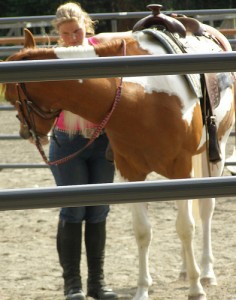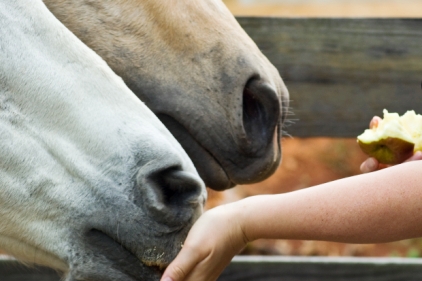 Whether you’re paying someone to train your horse, give you lessons, or simply choosing which trainer to watch and follow on RFDtv, it’s important to understand what you’re learning and make an educated choice concerning trainers. If you’re in the horse business for long at all, you will come to find out that not every horse person is refutable…in fact, there are quite a few “bad apples” when it comes to horse people. How do you know what to look for when choosing a trainer? Here are some questions to ask in order to help with your decision.
Whether you’re paying someone to train your horse, give you lessons, or simply choosing which trainer to watch and follow on RFDtv, it’s important to understand what you’re learning and make an educated choice concerning trainers. If you’re in the horse business for long at all, you will come to find out that not every horse person is refutable…in fact, there are quite a few “bad apples” when it comes to horse people. How do you know what to look for when choosing a trainer? Here are some questions to ask in order to help with your decision.
1. What are my horse goals?
First of all, decide what it is that you want to work on in your horse education and learning experience. Are you wanting to learn to train your own horse from the ground up? Are you interested in learning dressage or jumping? Do you need instruction to advance in Western Pleasure, or are you wanting to barrel race? Understanding what it is you want to do will help you choose a trainer. Then get recommendations on who is the best trainer around for that discipline. Use your powerful internet friend Google to search for “barrel racing trainer”, and filter through the results you get. Ask breeders in your area who they send their horses to, and get their opinions on which trainers are the best.
If you’re wanting to learn how to train your own horse, I have some pretty strong opinions about the popular trainers on television. If you are a novice horse owner and are afraid to ride, let me just say that you’ll love Pat Parelli’s show. Parelli teaches you to play Seven Games with your horse that are intended to help you achieve simple steps such as loading a horse in a trailer. It’s for the beginner horseman who doesn’t yet know how to catch his horse, and by the end of the games, you still won’t know how to put the saddle on. Parelli is not for the rider, and while it can be entertaining to watch, it’s not going to provide you with the knowledge you need to train a horse to ride.
The most popular trainer today is Clinton Anderson. A lot of people have come to rely on his methods such as “lunging for respect” and “desensitizing”. I think he is a valuable trainer to watch, but some of his techniques go a little too far, in my opinion. When he competed in the Road to The Horse colt starting competition, he had a gray horse in the pen just worn to a frazzle. He then took a leaf blower, chain saw, and bull whip to make a lot of noise around the horse and desensitize it to loud noises. I think he pushed the horse beyond the point of necessity, because it really took a lot of the character and life out of the horse. When I am riding a horse, I still want it to have an awareness about it that sometimes calls for quick movement to avoid danger. And this horse that he desensitized just didn’t have much sensitivity left.
My favorite horse trainer is Kevin Wescott, a little-known cowboy from central Nebraska. Like many other current horse trainers, he learned to train by watching the Dorrance brothers and Ray Hunt. Tom Dorrance was a personal friend of Kevin’s, and he says what Tom taught him changed his life as pertaining to horses. I have learned so much by watching Kevin horseback, and listening to him explain his timing and precision in cueing the horse, and what he is asking it for. My best advice in learning to train colts is to find a local trainer and ask if you can just watch every ride. You will gain so much by watching and asking questions.
So many trainers today are focusing too much on showing off by extreme measures. If standing on your horse’s back makes you a good trainer, then I guess that’s the thing to do then, right? Seriously, what is so cool about that? I see photos of trainers jumping their horses over people lying on the ground, photos of five people sitting on the same horse, trainers bouncing large rubber balls off of their horse’s backs, and more extreme silliness. If the training process involves endangering people or the horse, it isn’t a good one. And if the technique does not lend any positive education for activities the horse is going to be involved in, then it is useless. How about training the horse to ride and respond correctly to cues from the handler? That’s the kind of trainer I want.
2. What are the horses saying about this trainer?
Finding a good trainer also involves observing the horses a trainer is working with. You can tell a lot from a horse’s condition—physically and mentally. If a trainer is legitimately in it for the horse’s benefit, as every trainer should be, you will be able to see that. You can tell how much horse trusts his handler, by just watching as they work together. Horses can read people better than humans, and if you learn to see what the horse is saying by his body language and actions, you will know if you’ve found yourself a good trainer. There have been some big-name trainers outed for abuse, and the proof was in the horses.
When you first interview with a trainer, ask questions to find out if you agree with his methods. If you aren’t a rider who uses spurs, you might not want to hire a trainer who relies on spurs to cue your horse. Or if you know that your horse is going to need a lot of groundwork, and the trainer isn’t big on that, you know it’s not going to be a good fit. Talk to other boarders at the barn, or other folks who take lessons from the trainer, to ask for their recommendations. While you can’t always believe every complaint you hear about a person, by talking to others you can still get a pretty good idea of whether or not the trainer is approachable, easy to get along with, and knows his stuff with horses.
3. What can my horse and I gain from this situation?
There is something to be learned from any trainer, good or bad. If you watch every horse training program on television, you will find things you like and dislike about every trainer, and it’s really not about that. You want to gain knowledge of horses, and sometimes it means watching someone make a fool of themselves and learning what not to do with a horse! But often you can watch a training session and learn more from the horse than you do from the trainer. You will learn timing, and what happens when a trainer applies pressure and releases it, and how to increase pressure on a horse to get a response, and how to reward a horse through releasing the pressure. All of this can be seen with just about any trainer, and by watching how the horses act and react, you will gain knowledge that will help you in working with your own horse.
Working with a trainer in person, as opposed to watching videos or television programs, is a much more thorough way to learn, because you have a chance to ask questions and get personal instruction. If there’s anything I have learned about horses, it’s that every horse is different, and what you see a horse do on TV might not work at all when you try it with your horse. As a trainer, you have to adapt and be creative in order to gain the best from your horse. Some methods won’t work on every horse, and no technique is fool-proof. So getting help from a trainer in person is the best way to safely learn. Some of the TV gurus have equipped their viewers with just enough horse sense to get them badly hurt—because they give people the idea that they CAN do this at home with their horse, and then the horse doesn’t cooperate, or they don’t have a thorough grasp of the technique and the cues involved, and it all goes wrong. Don’t buy into the idea that horse whispering is something you get from reading books on horse training—you have to watch it in person, you have to listen to the trainer explain why he’s doing what he’s doing, and you have to be able to read a horse and understand what he’s saying with his body language and adapt your own body language to produce the desired response.
4. Are the trainer’s charges realistic for what I can afford?
This is a big one for me, because I am shocked at how much some of these trainers are charging today. I grew up riding, and have never taken a riding lesson in my life. My next door neighbor was a professional horse trainer, the aforementioned Kevin Wescott, and I always sought his help with my problem horses, which he always willingly gave me at no charge. He said Tom Dorrance never charged him a penny, either. He said those old-time cowboys were in it for the horses, it was never about making money. Well, those days are gone, I’m afraid.
My husband never had horses until he met me, but he always was a fan and wanted to know more about them. When he first started riding, he looked into spending a week at a horsemanship clinic, but the fees were a couple thousand dollars. This kind of training just isn’t in the cards for us, and if you’re in the same boat, you have to find something that works for you. This doesn’t necessarily mean you have to settle for less. Some of the best horsemen are little-known 4-H leaders in their community, and will offer their advice and help for next to nothing. Or if you’re in cattle country, seek out a local rancher who has good horses and hire his help. Many feedlots employ riders to work their cattle and sort out sick ones, and many of these are excellent horsemen who take in horses to train while doing their jobs. This type of trainer won’t have a big name, but his horse knowledge might be as good as any, and it won’t cost very much. It all depends on what you want for your horse, and how much you can afford to pay.
All in all, a good trainer is worth it. But only if you can truly benefit from his work and advice. Be as involved as possible in the process….there are many people who get their horse home and have the same problems they started out with. Or the trainer has not communicated well enough with the rider that little or no progress is made. This is why it’s so important to find a trainer that’s good with horses, good with people, and good to your bank account. Good luck in your search!


{ 1 trackback }